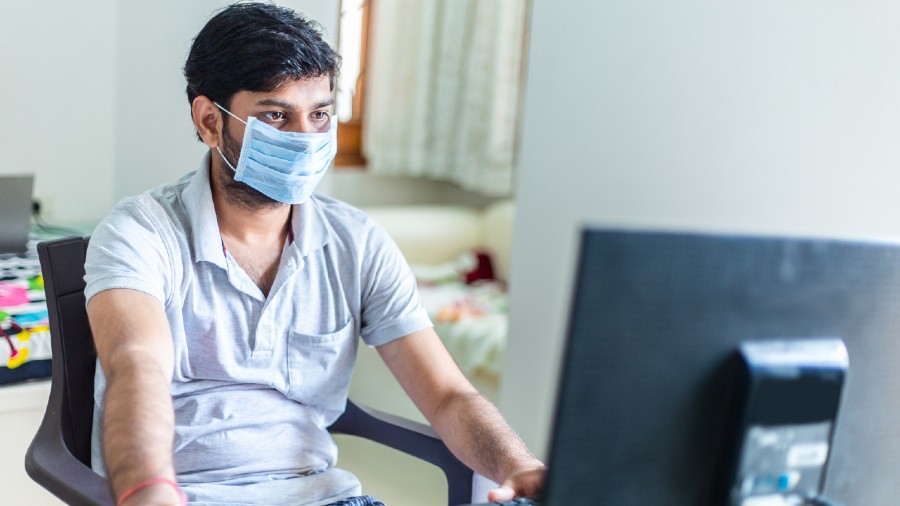A Covid-19 patient at home may end isolation after at least seven days have passed from testing positive with no fever for three successive days, the Centre said in new guidelines that cut the quarantine period from the earlier 10 days.
In Bengal, the isolation period was 17 days, according to guidelines in force. The federal guidelines released on Wednesday by the Union health ministry specify that there is no need for re-testing if the home isolation period is over.
Asymptomatic household contacts of Covid-19 patients need not be tested, the ministry said in the guidelines amid concerns that an omicron-driven wave might overwhelm testing capacities.
“Asymptomatic contacts of infected individuals need not undergo Covid-19 tests (but) monitor health in home quarantine,” the ministry said in the new guidelines that require patients to wear triple-layer medical mask at all times, with each discarded after eight hours of use.
The earlier testing guidelines from the Indian Council of Medical Research (ICMR) released in 2020 had required all household contacts to be tested as part of efforts to identify and isolate all positive cases and contacts to curb the infection’s spread.
But the epidemic’s current growth rate is even faster than it was during the country’s second wave peak in early May 2021 and has triggered concerns whether infection surges might lead to delays or shortages in testing resources as observed during the second wave.
“The numbers of Covid-19 infections are increasing exponentially for which quick home testing and rapid antigen test will serve as good diagnostic tools,” said Balram Bhargava, director-general of the ICMR. “And asymptomatic contacts should remain at home and need not be tested,” Bhargava said.
India’s documented omicron infections rose on Wednesday to 2,135 in 24 states with the largest numbers in Maharashtra (654), Delhi (464) and Kerala (185), but health experts say the epidemic’s patterns in multiple states reflect a spike rate hitherto unseen.
Health authorities on Wednesday recorded over 58,000 new Covid-19 infections nationwide, a sharp rise over the 37,000 cases a day earlier, a 56 per cent increase over a single day.
The omicron-fuelled surges in other countries have triggered concerns that India’s daily counts of infections at some point during the current wave might soar to levels even higher than the 400,000 daily cases on average during the second wave peak in early May 2021.
Through late April and early May last year, patients across the country had encountered delays in testing and results.
The revised guidelines also specify that patients should be isolated in a well-ventilated room and if a caregiver has to enter, both the caregiver and the patient should wear N95 masks. They urge patients with mild symptoms such as fever, runny nose and cough to perform warm water gargles and steam inhalation thrice a day and use paracetamol to control the fever.
“Do not rush for self-medication, blood investigation, or radiological imaging like chest X-ray or CT scan without consultation with your treating medical officer,” the guidelines recommend. Steroids are not needed in mild disease and should not be self-administered, they added.
Drug alert
ICMR chief Bhargava said on Wednesday that the Covid antiviral drug molnupiravir had major safety concerns and had not been included in the national protocol for treatment.
“It can cause teratogenicity (abnormalities in physiological development), mutagenicity (having the ability to cause a permanent change in an organism’s gene) and it can also cause cartilage damage and can also be damaging to muscles. Contraception will have to be done for three months for male and female if this drug is given because the child born could be problematic due to teratogenic influence,” he said.
The Bengal government had on Tuesday removed molnupiravir from its treatment guidelines.
Additional reporting by PTI











